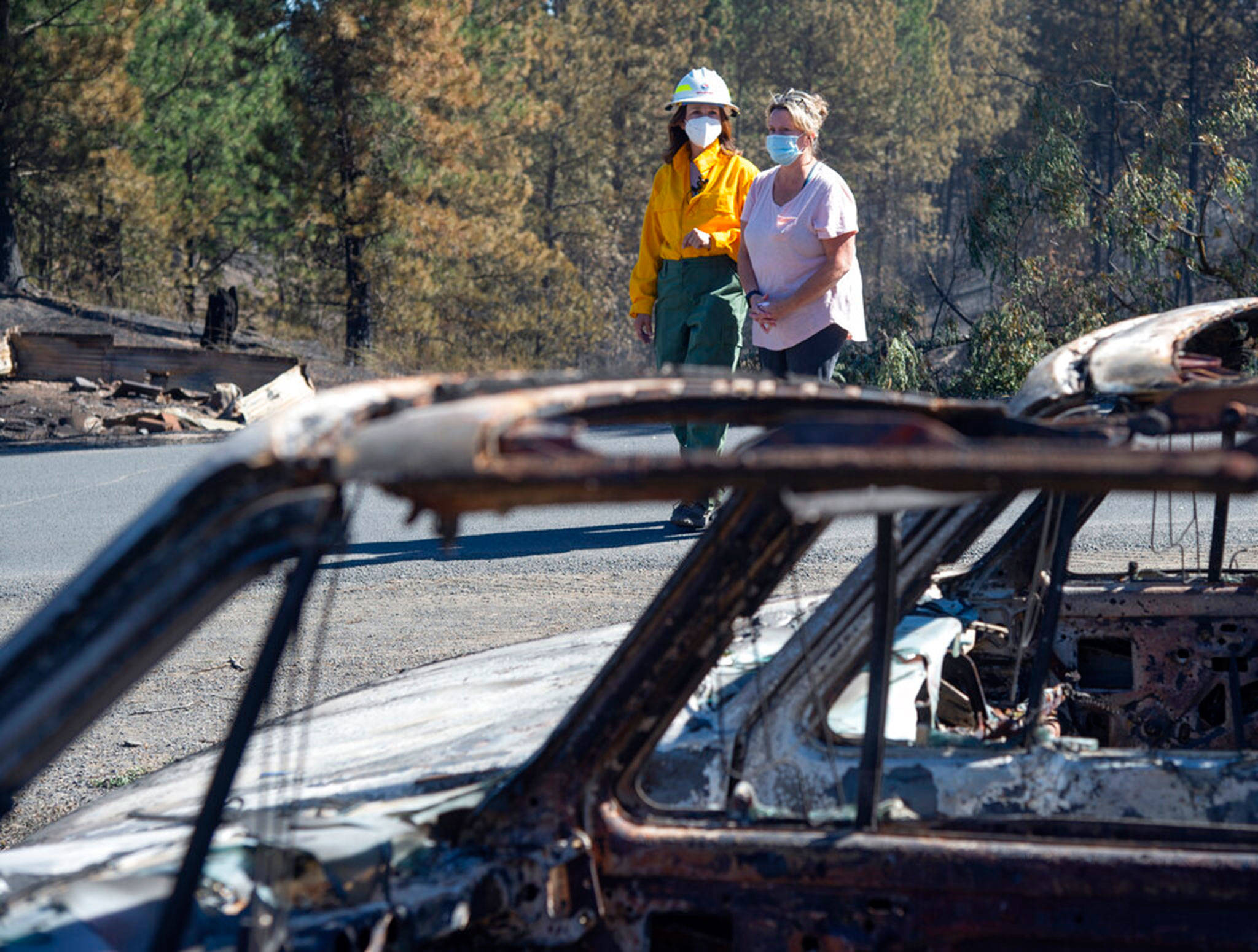By The Herald Editorial Board
It would be an oversimplification to describe the job of state Public Lands Commissioner as fire chief of the state’s largest fire department — but during a wildfire season that in just a matter of days this month threatens to be more destructive than a 2015 season that consumed more than 1.1 million acres and took the lives of three firefighters — the title does fit much of what has recently occupied the time of the current commissioner, Hilary Franz.
Elected head of the state Department of Natural Resources, Franz does oversee the agency’s wildlands firefighting forces, and — in an interview with Herald staff last week — provided a full report on ongoing efforts against fires throughout the state, noting acreage consumed and level of containment, while speaking grimly of the destruction she had witnessed.
“Within 72 hours over 600,000 acres had burned; that’s five times the amount of acres that had burned in 2019,” Franz said. “And it’s more than half of what had burned in 2015.”
Beyond that responsibility, the office manages some 5.6 million acres of public lands — 3 million in forest and other lands and 2.6 million in aquatic lands — set aside for timber and other resource production and leases, conservation and recreation, among the sources of revenue for the state’s public schools, state-level trusts and county-level districts.
The office also regulates forestry on private and other nonfederal and nontribal forest lands through the State Forest Practices Board and is responsible for providing geological information — now slowly being boosted by lidar mapping of geological hazards — to local governments, industry and others.
Franz, who was elected to her current term in 2016, previously worked as an attorney in environmental and land use law and for five years served as the executive director of Futurewise, an environmental and growth management advocacy group.
Franz, a Democrat, is challenged by Sue Kuehl Pederson, a Republican. Kuehl Pederson, with a master’s degree in public administration and a bachelor’s degree in biology, has been employed as a fisheries biologist with NOAA Fisheries, the Army Corps of Engineers, the state Department of Fish and Wildlife and King County’s DNR. She also has worked as a power manager with Grays Harbor PUD and power analyst with Seattle City Light.
Kuehl Pederson did not respond to requests to schedule a joint interview with The Herald Editorial Board. In a blog post on her campaign website, however, Kuehl Pederson, in the site’s only post, faults Franz for “treating the symptoms, not the causes” of wildfires by focusing only on increasing resources for firefighting but not prevention.
Kuehl Pederson’s analysis is incorrect.
“We have a forest health crisis,” Franz admits.
While it’s true that in recent decades not enough emphasis has been put on effective forest management and fire prevention, Franz during her term has been successful in working to reverse that history. She won increased funding from state lawmakers that has increased not only resources for firefighting but for forest health and fire prevention. Franz also has fostered improved communication and coordination among myriad local, county, state and federal agencies, including a stewardship pact with the U.S. Forest Service, the largest owner of forestland in the state, that along with forest health initiatives improves recreation by encouraging connection of trails among state and federal lands.
Franz, during the Legislature’s 2019 budget session, won $50 million of her $55 million request for improved funding that along with providing for the hiring of additional DNR firefighters and replacement of fire vehicles and helicopters — part of a 10-year strategic plan for wildfire response — also begins to provide for a 20-year plan to improve forest health, including efforts to thin overgrown forests, manage fire-prone forests with prescribed burns and work with landowners to reduce threats to homes and structures. For the seven years between 2005 and 2012, Franz said, about 30,000 acres of forestland — in total — saw those efforts; her office has set the goal of addressing work on 70,000 acres a year for the next 20 years.
Even as state lawmakers confront a budget crisis from reduced tax revenues, Franz said she would continue to fight for funding of her office’s efforts during the coming legislative session.
Earlier this year, Franz requested legislation that would have helped fund a newly created Wildfire Prevention and Preparedness Account by assessing a new fee on residential home and auto insurance policies. Under bills in the House and Senate, most policy owners would have paid between $12 and $15 to help fund the account, raising an estimated $63 million annually. The legislation did not advance, but lawmakers should reconsider it in the coming session.
Some will balk at the proposal of a new tax, but Franz’s advocacy of the legislation speaks to the importance she sees in making an investment now that will pay dividends in years to come in the potential for lives saved and property and resources spared from destruction and in reduced costs in fighting the wildfires we now face.
Beyond wildfires, Franz also has during her term made efforts to diversify the state’s portfolio of lands and their leases, including those for wind and solar generation and expansion of broadband internet in under-served rural areas, crucial access with so many students having to rely on remote learning during the pandemic.
This fire season has shown the increased importance that the office of the Commissioner of Public Lands will hold in coming years. Franz should be there to lead it for at least the next four.
Talk to us
> Give us your news tips.
> Send us a letter to the editor.
> More Herald contact information.

























